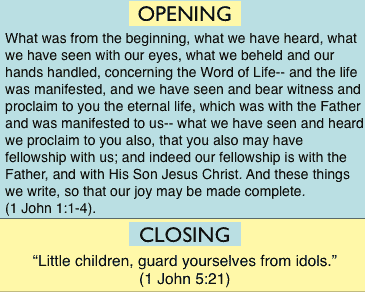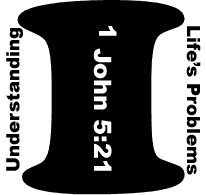|
|
B. Understanding Idolatry
1 John 5:21
Little children, guard yourselves from idols.
But I realize that many of you would quietly say, “Pastor. How can idols be dangerous when there are no idols around here.” We will later come back to this. We have more idols about us than we think. But even if there are, what danger do they pose us?
Are we to be afraid of idols? Do their mere presence threaten our lives? What is it that we are to guard ourselves against?
But it is clear that it is not the idol itself that is the problem but the attention or devotion that we give something. Paul says in 1 Corinthians 10:14, “Therefore, my beloved, flee from idolatry.” Idols then are the things that we focus on and give improper attention to. Idolatry is the act of giving reverence, affection and respect to an idol. We are specifically warned to guard ourselves from idols because their presence causes us to be ensnared. If it was their mere presence, then it would be like the early Muslims who would raid communities and destroy idols.
Surely, he does not mean that the idols themselves are anything. The Apostle Paul says,
What do I mean then? That a thing sacrificed to idols is anything, or that an idol is anything? No, but I say that the things which the Gentiles sacrifice, they sacrifice to demons, and not to God; and I do not want you to become sharers in demons. (1 Corinthians 10:19-20).
It is clear that it is not the idol itself that is the problem but the attention or devotion that we give something. Idols then are the things that we focus on and give improper attention to. Idolatry is the act of giving reverence to an idol. We are specifically being told to be guarded from idols because their presence causes us to be ensnared.
Let me give you an example. I have lived for long periods in societies where idol shelves were quite common. People would give great attention to certain idols. At times they would actually purchas e big paper houses and cars and burn them up. They believed that if this is done, then they could somehow help their ancestors now dead but perhaps living as spirits are still needing care and attention. Thoughts are closely associated with the idols. But if I take an idol that I see in India and put the elephant headed man idol on the Taipei small residential street, will people start worshiping it?
e big paper houses and cars and burn them up. They believed that if this is done, then they could somehow help their ancestors now dead but perhaps living as spirits are still needing care and attention. Thoughts are closely associated with the idols. But if I take an idol that I see in India and put the elephant headed man idol on the Taipei small residential street, will people start worshiping it?
No. They have no special fear or knowledge that they should give attention to this object. It is merely an object even though a certain Indian who sees it might have a whole set of thoughts and fears that come to mind. But if a person who likes this idol comes by and starts teaching others about it, people will start to believe and adopt certain lifestyles appropriate to it. This person is sometimes called a priest. The idol itself becomes a reminder of those thoughts and beliefs. This is how the danger of idols grows.
Let us now turn and see what this warning is all about.
Pure Heart
 Jesus said it very clearly. “And you shall love the Lord your God with all your heart, and with all your soul, and with all your mind, and with all your strength” (Mark 12:30). God wants our whole heart. He wants us to be consumed with His glory and purpose. This is the way He designed us to function. And indeed, if God is who He says He is, so mighty, powerful and awesome, it is only appropriate that we fully respect His person. Anything short of this smacks of idolatry.
Jesus said it very clearly. “And you shall love the Lord your God with all your heart, and with all your soul, and with all your mind, and with all your strength” (Mark 12:30). God wants our whole heart. He wants us to be consumed with His glory and purpose. This is the way He designed us to function. And indeed, if God is who He says He is, so mighty, powerful and awesome, it is only appropriate that we fully respect His person. Anything short of this smacks of idolatry.
He made us to be filled with God’s glory and love as we live in harmony with Him. This is what we find in the life of Christ. If you can’t put your finger on what made Jesus so special, this is it. His selflessness did not end up to be a wishy-washy kind of tolerant person. He was very deliberate in obeying the Father. As He busied Himself doing what the Father wanted, He ended up loving mankind for God is love. The fullness of life is found in knowing God and knowing Him deeply.
Do you see this pipe? It is flowing only in one direction. It illustrates a person’s affections being only upon the Lord. We do see two other potential outlets of his affection. It is possible for him or us to put our heart on other things. But no. Those outlets are shut off. So all of his affections flow toward God. The Spirit of God flows into our lives only where there is welcome. Its welcome is shaped by our faith or trust. If we trust the Lord to work in us, then He works mightily in us. Let’s look at what idolatry looks like.
Split Devotion
Whenever our hearts put focus, attention and affection on something or someone other than the Lord, then it is in these areas that we do not perfectly love God as Jesus has instructed us. We were designed to completely love and trust Him.
 Our split devotion is seen through the excuses we make, the temptations that we give in to and our disobedience, whether purposed or stemming from ignorance. We might not even notice our lackluster devotion to God but God surely does. Remember God is a jealous God.
Our split devotion is seen through the excuses we make, the temptations that we give in to and our disobedience, whether purposed or stemming from ignorance. We might not even notice our lackluster devotion to God but God surely does. Remember God is a jealous God.
"So watch yourselves, lest you forget the covenant of the LORD your God, which He made with you, and make for yourselves a graven image in the form of anything against which the LORD your God has commanded you. For the LORD your God is a consuming fire, a jealous God” (Deuteronomy 4:23-24).
The fullness of the Holy Spirit is ours if we make room for Him but wherever we allow split devotion, then we are blocking the River of Life from fully flowing into our lives. We must not only love Him with some of our heart, some of our soul, some of our mind or some of our strength.
-
Does God almighty take pleasure in our half-hearted worship?
-
Do we dare to call this split-devotion worship at all?
-
What if we are such a person who comes to church?
-
Does God genuinely take pleasure in us?
Take a moment. Where are you at? What does God think about your worship? Is it with all your soul? Were you eager to meet God this day? Are you more excited about your own plans after worship than learning from His Word? Are you more enthralled with your own life plans than with His kingdom plans? Even after noticing your split devotion, how do you respond?
 Postscripts of 1 John
Postscripts of 1 John
We are only discussing 6 words out of the whole book of 1 John. This is the last and fourth postscript that John carefully adds to the end of the book. John’s very last words. These last ‘post-thoughts’ contribute only a fraction of the book (.233% of all the words) but they are very important. (6/2570/100=.233%).
But it is carefully placed. Notice how it complements the beginning thought of the Book of 1 John.
The opening of the book has a fit closing.
 We find here both and opening and a closing. Much like a good book or play, it doesn’t start at the end or even the middle. Nor does it leave the original thought left hanging. John carefully comes back to the theme set in the beginning but from another perspective.
We find here both and opening and a closing. Much like a good book or play, it doesn’t start at the end or even the middle. Nor does it leave the original thought left hanging. John carefully comes back to the theme set in the beginning but from another perspective.
In the introduction John shows us the glory of close communion with God through Christ. All the great things that you hoped to be are yours in Christ. Love, joy and peace.
In the closing he points out what can frustrate the privilege of close fellowship with God. John had seen it happen again and again. A Christian all of a sudden seems to hit some spiritual struggles. He is confused. She doesn’t know what to think. Their joy, devotion and sincerity drift away. This is why John says these last few words. He is helping us to prevent us from losing the full enriching life in Christ. Let’s think about John’s words a bit more. Next =>
BFF Homepage | Top | Back | Bible Topics | Questions on 1 John 5:21 | 1 John intro
Biblical Foundations for Freedom
Rev. Paul J. Bucknell

